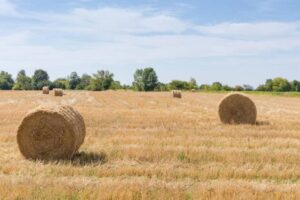As a farmer, you know the importance of having high-quality equipment and materials on your farm. Baling is an essential part of the harvesting process, and choosing the right baler twine, including the consideration of durable baler twine, can make all the difference. With so many options in today’s market, determining which is best for your specific needs can be overwhelming and challenging. That’s why we’re here to help. In this article, we’ll discuss everything about baler twine – from its uses and benefits to the different types of twine available and how to choose the perfect one for your farm.
 If you’re a farmer, you know how critical it is to have quality hay bales for your livestock. And while many farmers focus on the hay quality, it’s easy to overlook the importance of finding the right baler twine. The proper twine can significantly impact the overall quality of your hay bales and even affect the longevity of your equipment. Poor quality twine can lead to breaks and knots, which can mean damaged bales and a loss of productivity. So, choosing the right twine for your farm is vital to ensure you get the most out of your equipment and, ultimately, your hay crop.
If you’re a farmer, you know how critical it is to have quality hay bales for your livestock. And while many farmers focus on the hay quality, it’s easy to overlook the importance of finding the right baler twine. The proper twine can significantly impact the overall quality of your hay bales and even affect the longevity of your equipment. Poor quality twine can lead to breaks and knots, which can mean damaged bales and a loss of productivity. So, choosing the right twine for your farm is vital to ensure you get the most out of your equipment and, ultimately, your hay crop.
Choosing the right type of twine can make all the difference in baling. There are three main types: natural fibre, synthetic, and blended twines. Each has its own unique set of characteristics and benefits. Natural fibre twines, such as those made from sisal or hemp, are biodegradable and eco-friendly. On the other hand, synthetic twines are typically stronger, more durable, and weather-resistant, making them ideal for outdoor use. Blended twines offer the best of both worlds, combining synthetic materials’ strength with natural fibres’ eco-friendly properties. By understanding the differences between these types, you can select the most durable baler twine suitable for your specific needs.
When choosing the proper baler twine, weighing the pros and cons of each type is crucial. One critical consideration is strength. You want your twine to be robust enough to handle the tension of baling. Durability is another significant factor, as twine that wears out quickly can lead to costly breakdowns and lost productivity. And while weather resistance might not be top-of-mind, it’s essential: exposure to the sun, rain, and other elements can cause twine to lose strength quickly. But these are just a few considerations. Other factors like knot strength, price, and environmental impact should also be considered. So, whether you’re wrapping hay bales or packaging cardboard boxes, thinking through your twine options will help ensure a successful outcome.
Maintaining your baling needs is critical to ensuring efficient and effective farming operations. One key aspect of this is selecting the appropriate length and thickness of twine. The right twine will be durable enough to withstand the rigors of long-term use and lightweight enough to allow for seamless baling. To make the best choice, it is crucial to consider aspects like the size and weight of your bales and the type of equipment you use. By understanding these variables and choosing a durable baler twine that meets your needs, you can enjoy reliable and consistent results from your baling operations for years.
Baler twine is essential for any farmer or rancher looking to keep hay and straw bales securely bound. However, proper storage is critical to ensuring this twine maintains its quality and doesn’t go to waste. One great tip is to keep the twine in a cool, dry place, preferably out of direct sunlight. Humidity and heat can cause the twine to weaken and even rot over time, leading to breakages and wasted products. It’s also a good idea to invest in a sturdy twine dispenser that will keep the twine clean, dry, and organised.
Effective use of suitable baler twine is essential for farmers to maximise their productivity and profitability. Farmers can ensure that their hay bales are tightly secured by selecting the correct type of twine for the job, which substantially impacts the bales’ quality and value. A high-quality bale, produced with the proper twine, can help reduce the amount of hay wastage during storage and transportation, thus maximising their profits. Investing in high-quality baler twine is a crucial element of modern farming practices. It is essential for farmers looking to optimise their productivity and profitability in the long run.